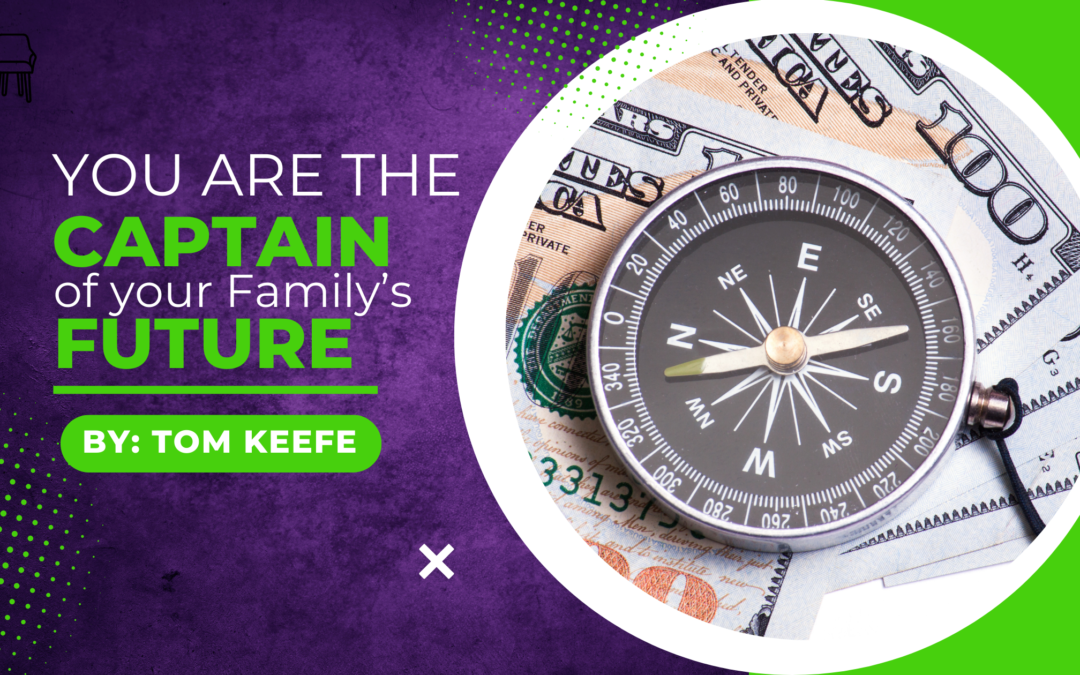By: Tom Keefe
You are the captain of your family’s future. Think of your job as the engine powering your future. How much horsepower does your job have? Answer this question.
“If a person were without a job, and had to live on investment income, how much money would they need to invest earning 4% to replace lost income from that job? “
To get the answer, Multiple your job’s salary by 25!
Yes, a person with a $50,000/year job, is in control of personal financial resources large enough to make them more than a millionaire! It is like having $1,250,000 in the bank paying $50,000 of interest every year. The bottom line is to use the money you earn wisely. Just like you would expect a millionaire to do – support your lifestyle, get out of debt, & accumulate wealth!
Good Debt and Bad Debt.
How do you know if you are using your money wisely? Look at your debt. There is good debt and bad debt. Bad debt builds more debt, while good debt builds wealth. If you are building bad debt, you are not using your income wisely.
Good debt helps you build wealth. You may need to take on debt to get an education. If student debt helps you earn a better living, it is good debt. Your mortgage can be good debt, if your mortgage gives you a place to live and the house goes up in value, it is good debt.
Bad debt builds more debt. You cannot get wealthy by taking on bad debt. Because cars go down in value over time, buying more of a car than you need to reliably get around is probably a bad debt.
Being upside-down in your car.
Car debt is bad debt when you take on more debt to finance each new car – this is called being upside- down. When a person is upside-down in their car payments, they roll over the remaining car loan balances into a new larger loan just to be able to buy the next kind of car. Remember, bad debt grows and grows, it Compounds over time!
Credit Card Debt.
Apart from cars, the most frequently encountered bad debt is credit card debt. Credit cards should be used for things that we consume every day. If you pay off your credit card balances each month, it is not a problem. If you pay off your credit card balance each month, you are using your card responsibly and probably have a good credit rating. If your credit card balances are going up each month there is a problem. You may feel poor. In fact, you are living on more than you make, and your credit card debt is bad debt, probably with a very high interest rate too. This kind of bad debt compounds fast because the interest rates can be so high.
If your credit card balances are going up each month, you are living on more than you make, you will need to make changes to get your debt under control before compounding makes your bad debt spirals out of control and forces you into bankruptcy. You only need to get your credit card balances to go down each month even by just a little bit!!
How the debt hole gets bigger!
Compounding and the “rule of 72”. The rule of 72 tells how long it takes to double a debt balance or an investment, based on a given interest rate. For example, if a person doesn’t pay on a credit card that charges 24%, it will only be 3.2 years before the balance doubles (72/24). An investment earning 10%, doubles in 7.2 years.
Put the power of compounding on your side.
Start by living on just a bit little less than you make. Even $10/week is a good start! If your credit card balances are going down, you can put the power of compounding on your side and start building wealth.
For example, if a person born in 2000, works to age 65 and puts away just $40/month, with a long-term rate of return equal to the S&P 500 stock index (according to Investopedia the long-term rate of return for the S&P 500, is about 10.26%), they could accumulate about $276,000 over their work life. Yes, $276,000!!! Think how much money you can build if your credit card debt were invested!!! Over that same period, $200 per month could grow to nearly $1.4 million. This is why the banks are so wealthy, they put compounding on their side!
To get your credit card balances to go down, try this.
Most people have more than one card. Pick one that you will pay off each month. Stop charging on the other cards and make minimum payments on those.
Needs versus Wants.
Pay for your needs each month (things like housing, utilities, food, clothes).
Stop charging on your credit cards for wants that you cannot afford (things like lottery tickets, subscriptions, eating out, impulse buying at the corner store, gifts, holidays). You don’t have to stop buying everything, only the things you cannot pay for that month. Remember, pay off each month the one card you chose to charge on.
Use some of the money you have freed up to start an emergency fund, $250-$500 will work! Build a fun money account to reward yourself and the family! Use the money you aren’t spending to build wealth! Even $10/week is a good start!
OTHER WAYS TO CONNECT
We hope you found this information helpful! Do you have any thoughts? Please connect with us on Facebook and Instagram and let us know!
If you would like to learn more about upcoming events, sign up to receive our quarterly newsletter here.
Check out some of our other blog posts here, for tips and tricks for single parents, budget hacks, inspiration and more information about what we do here at SPARC Hope.

